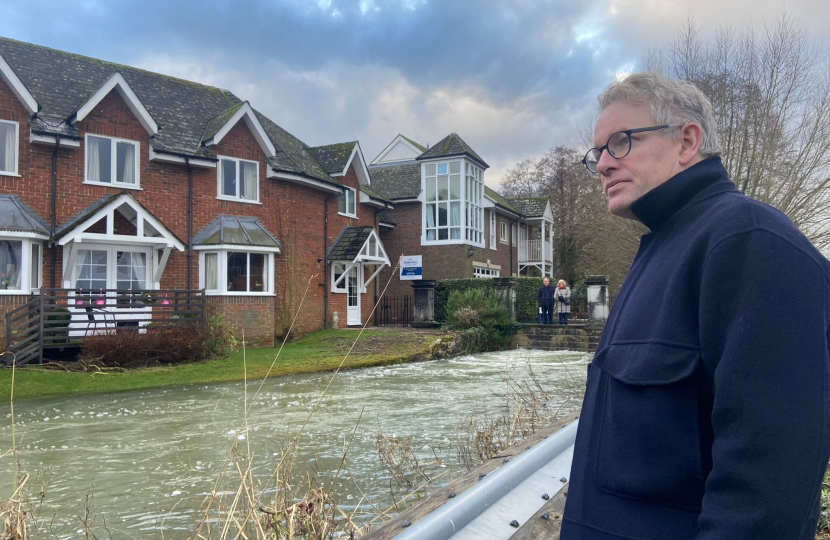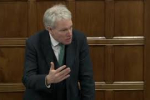
Happy new year. I experienced what is apparently called the pathetic fallacy this week: the projection of one’s mood into the weather. The land was sodden, the skies grey. Then the waters rose and suddenly the countryside was a series of lakes, with island villages. On Friday the Kennet in Marlborough was nearly at the brim of the new defensive wooden bank, which no doubt helped reduce the damage that followed - but they could not prevent it, for with the river full the groundwater had nowhere to go. Val Compton, who lives on the riverfront (I first met her a few years ago tending the garden she had created under the wooden wall), described to me watching a damp patch appear in her carpet, and then within minutes the whole floor was bubbling. Soon it was knee deep. Other neighbours showed me pictures of their fridge floating on its side around their kitchen. Everyone along the river was evacuated, some by canoe.

I spent Friday evening in the town hall with a few dozen evacuees, kindly supported by a team of volunteers and staff from the town and county councils. Everyone found friends or relatives to stay with - I had the pleasure of giving a lift to the last lady to her friends on higher ground (who had had Ukrainians in her room until a few months ago). The atmosphere in the town hall was stoic, cheerful, resilient.
On Saturday the sun was peeping out. People took their sodden carpets to pieces with Stanley knives and piled their wrecked furniture in the road. In front of the secondhand bookshop was the stock that had filled the bottom two shelves around the shop (‘the cheap and cheerful stuff’, the owner told me with a shrug). Neighbours were helping each other as you’d expect, and most reported positive conversations with their insurers. I heard nothing but praise for all the agencies involved - fire and rescue, town council, Wiltshire council.
People generally behave well when things go wrong; at least in Britain, or so I like to believe. The weather is better now and we are forecast a dry period.
The management of the Kennet is bound up with development, particularly housebuilding. Badly designed houses cause run-off rainwater to swell the sewers and lead to sewage spills into the rivers; and badly located housing can increase the flood risk. I have been battling alongside Wiltshire Council - particularly former leader Philip Whitehead, current leader Richard Clewer and cabinet member for planning Nick Botterill - to stop the outrageous practice of large housebuilders using loopholes in planning law to impose large unwanted and unnecessary new developments on our rural communities. We need more housing in WIltshire, but of the right type (affordable family houses) and in the right places (in small numbers in our villages, and in the towns to the west of the county) - not ugly big estates of ‘executive homes’ on the edge of villages in the already overbuilt (but more valuable to developers) east.
I was greatly relieved that our lobbying worked and before Christmas the Government announced a new National Planning Policy Framework which closed the biggest loophole exploited by developers, the Five Year Land Supply rule. In future places like Wiltshire which already build enough homes for local and national needs will be able to refuse permission to developments that do not fit the plans agreed by local residents. This is a great victory and will help protect our beautiful environment while ensuring homes continue to be built for local families.
The run-up to Christmas in Parliament was dominated by the new Safety of Rwanda Bill, which was brought forward by the government after the Supreme Court ruled its previous bill designed to ‘stop the boats’ - the Illegal Migration Act - breached the European Convention on Human Rights, and other international protocols.
I fear the new Bill will also fall foul of the courts, for reasons I set out in my speech and statement (see here). As I say there, ‘we are a decent and humane country and we don't need contested notions of international law to decide how we manage our borders… I would welcome further changes that protect vulnerable individuals and ensure there are safe and legal routes for refugees to seek asylum in the UK…[But] the most important thing is that the Bill succeeds in its mission to 'stop the boats' and restores control of our borders. We have promised this; so far we have failed; we must not fail again.’
I abstained on the second reading of the Rwanda bill and am working with colleagues and ministers to get a bill that we can all support in its remaining stages through Parliament.
Last month I took part in the launch of a new All-Party Parliamentary Group which I co-chair with Lord (Nigel) Crisp, the former Chief Executive of the NHS. Called ‘Beyond Pills’, the APPG grew out of the campaign which Nigel and I fronted, led by some brilliant doctors and former patients, to raise awareness of prescribed drug dependency. It will make the case for a better medical model than ‘a pill for every ill’, working with the College of Medicine and other experts (including The King’s doctor, Dr Michael Dixon, who spoke at the launch) to raise awareness of alternatives to pharmaceuticals for the treatment of many conditions, including mental health ones. Read more here.
I have been tweeting out the minutes of the Woodford Valley Conservatives 1994-95, a work of comic genius by Jane Rasch, who was I believe press-ganged into taking the notes at these meetings and took her revenge when typing them up. They are a chronicle of benign befuddlement among a group of loyal but somewhat laid-back local Conservatives, in which political discussion is discouraged and most of the conversation revolves around querying, but then accepting, the minutes of the last meeting; the best and cheapest cheese to buy for fundraising events; and whether Sting (a Woodfords resident) might support or even vote for the Party. I commend them to you. My latest instalment (and the whole thread so far) is here.





